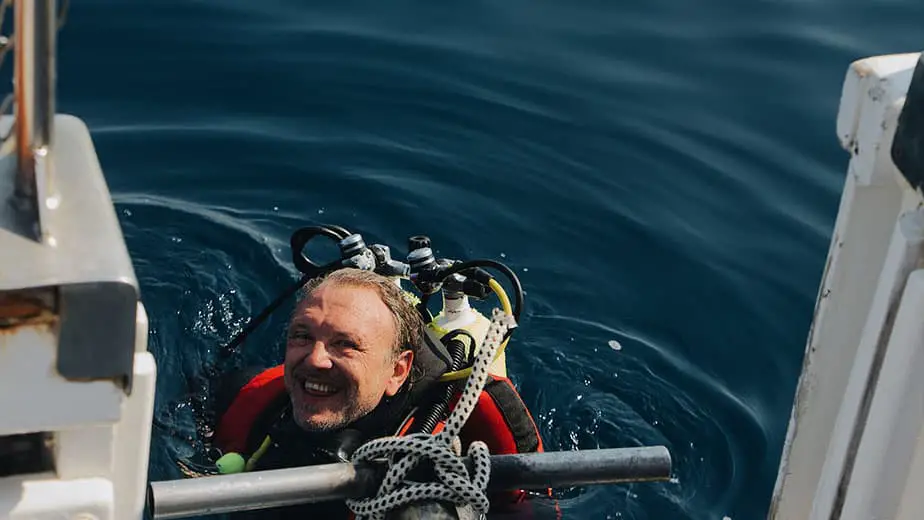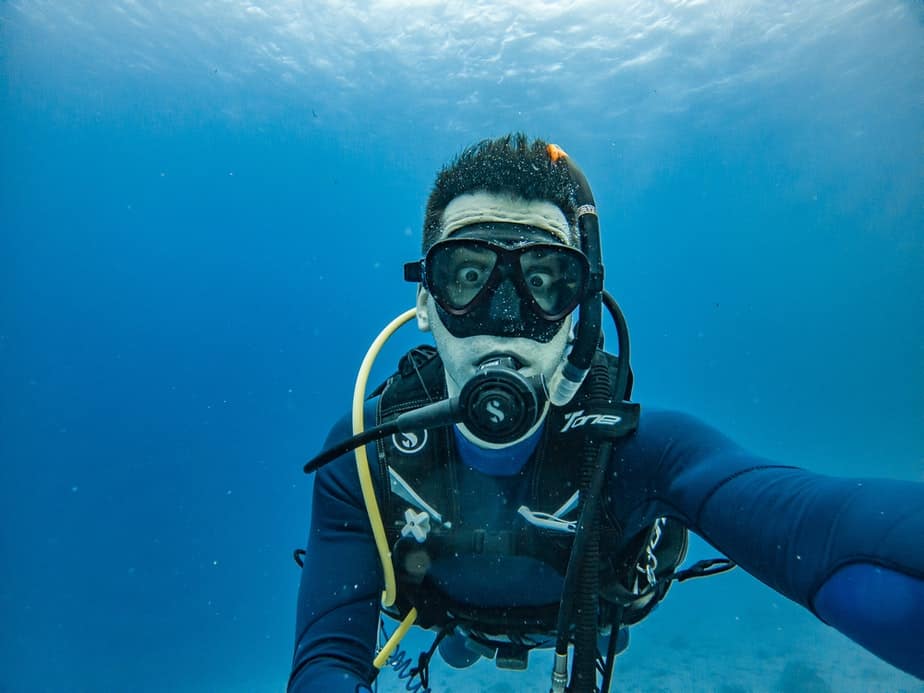Today we’re going to talk about a very serious topic: flatulence (i.e. passing gas or farting). Specifically, can you do it in a tight wetsuit, or even better, can you do it while scuba diving? This question has been raised thanks to a particular meme of an individual wearing a “wetsuit” (hint: it’s not a wetsuit) that has been overly inflated along with the caption: “Never fart in a wetsuit” or something to that effect.
Hopefully most people understand that the “farting in a wetsuit” picture is just a funny scuba diving meme not to be taken seriously. However, the question it raises is an interesting one. On the surface you can skillfully maneuver yourself to discreetly pass gas, but how does it work underwater? The answer is: of course you can fart while scuba diving. However, pass a certain depth, you likely won’t even feel the need to.
In this article, we’re going to cover the very wonderful topic of the effects, causes, and outcomes of farting in a wetsuit while scuba diving.
Can you fart while scuba diving?
You can fart while scuba diving, so do it loudly and proudly. Farting underwater is something everyone does, just like peeing in your own wetsuit, and there’s nothing to be ashamed of. Everybody farts. It’s a natural part of our digestive process and the average person does it 13 to 21 times a day. This produces approximately 500 to 2,000 mL of gas.
The amount and strength of your fart is affected by the foods you eat over the course of the day, environmental factors, and health problems. While scuba diving can affect whether you feel the urge to fart or not, it’s very common to feel the need to let one rip during a dive and the process is the same as it is on land.
Farting is just the result of intestinal gas produced by digestion accumulating to a large enough volume that the body feels the need to expel it. With a modest squeeze, the gas is released into the water where it will form bubbles and camouflage itself with the bubbles exhaled from your regulator. Just make sure you don’t squeeze too hard.
Depending on how tight your wetsuit is, tiny gas bubbles might get stuck in your suit which slows down the bubbles release into the atmosphere. The neoprene wetsuits are waterproof and they will also trap air bubbles. As such, you should not expect to see air bubbles release from your behind, but from around your neck, arm, or ankle openings.
How does farting in my wetsuit affect my buoyancy?

As divers we understand that buoyancy controls how we go up and down, and that buoyancy changes as we change depth. As we descend, the air in our body and scuba gear compresses due to the water pressure, causing us to lose buoyancy. Conversely, on the ascent the air in our body and scuba gear expands to its original volume, so our buoyancy increases.
The way we deal with these drastic shifts in buoyancy is by making small adjustments to our buoyancy control device (BCD). The goal of buoyancy control is to remain close to neutral buoyancy, to the point that inhaling and exhaling can cause us to rise or fall a little. When the balance is so easy to be disrupted, you might be wondering if releasing a fart will affect it.
Thinking about it logically, farting is a release of gas from your body (think of it as exhaling from your behind) which means you will become less buoyant. With that said, the impact should be minimal due to the fart’s small volume.
The volume of the average fart is around 90 mL, and the average inspiratory capacity that we can breathe is about 3 L. Due to the large shifts in air volume due to inhalation and exhalation being significantly larger than the volume of gas expelled from farting, you’ll hardly notice a difference. Even without moving, the average human has a tidal volume of around 500 mL.
Even though farting technically does affect buoyancy, it does not do so in any significant way so it’s more accurate to say that farting doesn’t really affect buoyancy. Even if you are wearing a wetsuit or drysuit that traps the fart inside, it shouldn’t make much of a difference at all. So don’t think you’ll suddenly plummet like an anchor just because you ripped a big one.
How does depth affect farting during a dive?
According to Boyle’s Law, all gases will decrease in volume as pressure increases. Put into the context of scuba diving, that means that the deeper you dive, the greater the water pressure which causes all gases in your body to compress and shrink in volume. This means the gases in your scuba cylinder, lungs, ears, even your farts will decrease in volume.
You should be very familiar with compression because it’s what forces you to equalize your mask and ears to prevent facial and ear barotrauma. It’s also the reason why the deeper you dive, the faster you’ll run out of gas because your supply will get drastically reduced by the pressure.
With this in mind, all the gas in your digestive system will also get compressed to such a point that you won’t even feel the urge to fart. The water pressure will also make it difficult for the gut bacteria to produce sufficient gas that you can expel.
Indeed, the pressure is so great even for recreational diving that the gas in your system will be so miniscule it won’t even get released. At a depth of only 20 m (66 ft), all of the gases present will be compressed to a third of its normal volume. Furthermore, the pressure will make it difficult for the gas in your digestive system to move.
Once again speaking hypothetically, if a diver was to stay at this depth and swallow a lot of gas (gas which is the same pressure as the surrounding) then the diver may be able to build up enough gas in their body to fart it out. However, this would surely use up the gas supply quickly and cause the dive to end quickly.
Lastly, once a diver ascends and the gases start expanding due to the decreased pressure, then the gases in your gut will also expand and your normal urges to fart will return. Just make sure to fart before you get on the boat.
Is farting while scuba diving safe?
Yes, you can safely fart while scuba diving just as you can safely exhale during a dive. There’s not much difference: gas is being released from your body, just from a different hole. So if you feel the urge to let one loose underwater, there’s no point holding it in, just release it.
Keep in mind that even if you hold in a fart and then the urge goes away because the gas got compressed due to the water pressure, it will simply expand back to its original volume once you ascend. In other words, the urge will return again; scuba diving does not magically make the urge disappear, so you need to deal with it. If you’re embarrassed, try to hide your fart bubbles with the bubbles from your regulator.
Does scuba diving make you want to fart?

In addition to the natural gases released as part of digestion, gas can also accumulate from air-swallowing. There are various things we do that cause us to swallow air without realizing it, such as swallowing food, taking a drink, or swallowing our saliva. Each of these actions causes us to swallow some air.
The air will accumulate in your digestive system, mixing with the digestive gas and contributing to the overall volume of the gas inside. If the gas is still in your stomach, you can release it by burping. Once it’s closer to the other end, you’ll need to fart it out.
Furthermore, the air you swallow at depth might seem insignificant because it’s compressed, but it will expand as you ascend to the surface. Anxious people will swallow more air because they are swallowing their saliva more often. If someone was exceptionally nervous, they might swallow so much air that they need to expel it during the dive.
In a dive context, the action that is most likely to accumulate the most gas in your system is when you swallow air to equalize your ears. Some equalization techniques like the Toynbee Maneuver or the Lowry Technique require you to swallow air. If a diver were to struggle with equalization, they might swallow a lot of air because they need more attempts to be successful.
Additional factors that can cause gas to be produced while diving may include:
- Chewing gum.
- Drinking carbonated beverages prior to diving.
- Eating and drinking quickly.
- Eating foods that release a lot of gas, such as dairy, legumes, and beans.
As you can see, scuba diving does NOT cause you to produce more gas, however there are foods that you eat prior to diving or actions you perform underwater that might.
What happens if you fart in a drysuit?
Unlike a wetsuit, which has openings that let some water in and out, drysuits are designed to keep you dry. This means that it needs to be watertight and airtight.
The way drysuits work is that it fits loose on your body and gets inflated and deflated as necessary. You can control this using the inflator button, and there is a vent valve which releases the air.
When you fart in a drysuit, you are moving the gas from the inside of your body to the inside of the drysuit. However, since the gas is at the same pressure as the air in the drysuit, there is overall no change to your buoyancy. The fart will, however, be trapped in your drysuit until it’s vented out.
If you don’t want to dutch oven yourself or your dive buddy, just pray that the fart is vented from the suit while you ascend. Conversely, if a diver asks you to help them unzip their drysuit and they have a big grin on their face, be wary of an incoming attack on your nose.
Does farting underwater amplify the sound?
Water affects how our ears perceive vibrations, which is why it’s so hard to understand someone trying to speak to you underwater. Plus, if you’re diving with a regulator instead of a rebreather, the bubbles will make a lot of noise underwater so it’s easy for a fart to be concealed as an exhalation.
Even though sound travels further and faster underwater, it’s hard to tell the direction a sound comes from. Even if you heard a noise that sounds suspiciously like a fart underwater, it may not even be a fart, and it’d be hard to determine which direction it came from.
Plus, even if you were looking right at your dive buddy, once again, it’s really easy to conceal a fart with the bubbles and noise that a regulator makes.
Parting words
To sum up this article: yes, you can fart underwater, and no, it’s not going to inflate your wetsuit like a balloon. There are many factors that can cause you to fart. The most obvious factor is consuming food or drinks that release a lot of gas. You can also accumulate gas by swallowing air. Once you have enough gas built up, you can safely release it by farting underwater.
Depending on how deep you dive, the increasing water pressure can cause the gases in your body to compress to a fraction of their original volume. This may also reduce your urges of farting. However, when you ascend and the pressure decreases, the gases in your body will expand to their original size and you’ll want to fart again.

